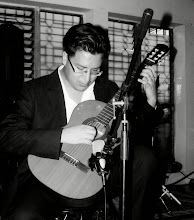Thoughts on Listening World Music, II
- Experiencing the Roots of Music: The San Bushmen of the Kalahari -
Essay for the University of Pennsylvania.
Since I was a kid, I used to think all the
news I watched on TV were about my place. While I heard about the
ongoing war between Palestine and Israel, I felt very sad for all the
kids my age who weren't able to spend their childhood playing, and being
with their family, like any regular kid does, despite living in the
same place as I did. While I heard traditional music (still being a
kid), no matter where the music came from, I used to think it was from
my place, and I thought how wonderful the place I lived in was, unaware
of the fact that the world is divided by frontiers or cultural barriers.
I used to think the world was like a big
neighborhood, where everyone knew each other, and helped each other if
they wanted and were able to. While looking at the Kalahari Bushmen /
Khoisan Trance dance, I return to these times of my childhood, where I
saw the world as a big neighborhood. I could definitely hear how
spiritual (or trance-like) dances relate to each other, no matter the
place of origin of the performed dance. Every trance dance has the same
purposes, heal the individual or the community that undergo that
experience. The Bushmen people of the Kalahari have faced land trouble
just like Palestinian people. Despite being the oldest habitants of the
lands they inhabited (and the oldest habitants of the world), they have
been forced to leave their own territory, the same they have been part
of for a long time.
Listening to the Kalahari trance music I
experienced a lot of things. I felt a strong connection with the core of
the earth and the universe we're part of. The trance the shaman (or
healer) undergoes reminds me of the trance people in the Amazonas go
while doing Ayahuasca rituals, where the participants ingest the
ayahuasca extract in order to heal themselves spiritually, in order to
set themselves free from their fears, even the ones deeply rooted in
their subconscious. The interesting part of Kalahari music to me is that
most of it seems to have an spiritual background, and the shaman is
something of a vehicle between enlightment and darkness: He is the light
of the individual, guiding him through the darkness of his own
thoughts.
My thoughts of what is achieved through this ceremony have
been somehow confirmed. I think sacred ritual ceremonies where music and
the performer (the shaman in this case) try to enlighten or heal a
certain group of people are really working towards it. The importance of
sound and how it resonates in our body (which is composed by some
resonating areas) is clearly a concept shamans understand very well, and
they know what kind of sounds they could use to evoke a certain state
of mind in a group of individuals. The San Healers of the Kalahari feel
they have a big task in their hands, which is to preserve their people
healthy, without any kind of spiritual remorse. In this case, I don't
think authenticity preclives accesibility.
Ceremonial rituals are not
popular music, or anything of that matter. Those rituals are here to be
witnessed and experienced for everyone who wants to be part of it. I
don't think there's any type of soffistication behind these rituals, in
fact they are very intuitive. And intuition is something we all people
have in common, some have developed it more than others though. As for
accesibility, if shamans are open to let everyone be part of the
experience, why we listeners (or audience) wouldn't join the performance
? Every shaman in this world, no matter his/her background seeks a
common goal: The healing of mankind, no matter their race, color of skin
or anything. It's we people who live in the "civilization" who try to
rationalize something that is something beyond our understanding,
instead of respecting it and sharing it with as much people as possible.
Rather than differences of culture,
I believe there are similarities of
background, thought, purpose of artistic manifestations in every single
culture of this world. Kalahari Bushmen are no exepction, and I may add
that our own cultures have inherited something of their traditions. The
fact that there is always a certain type of chant, or dance considered
sacred in every culture of the world, no matter its religion,
geographical situation, etc. is somehow a direct connection of the
ancient people of the Kalahari and us, their descendants.


No comments:
Post a Comment